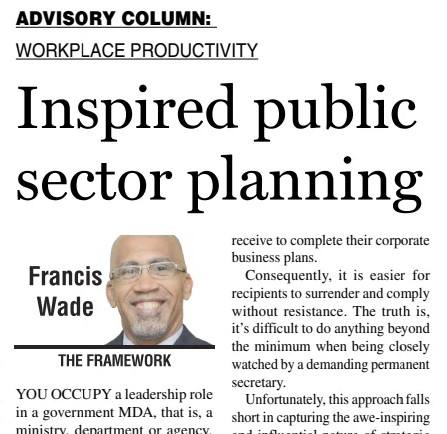As a leader in a government Ministry, Department, or Agency (MDA), you’re deeply committed to creating strategic plans that make a significant impact. However, it’s easy to get caught up in bureaucratic compliance, which can divert you from making the meaningful contributions you desire. So, how can you truly make a difference?
For those outside of government, the hundreds of pages of planning guidelines sent to MDAs may seem overwhelming, prompting the question: “How does anything get done?” Having provided strategic planning services to organisations in Jamaica for over two decades, I understand this challenge.
The guidelines are well-intentioned and represent hard work, but sometimes, a collection of good ideas doesn’t lead to a single great one. This is often the case with the instructions MDAs receive for completing their corporate business plans.
As a result, it can be tempting to simply comply with the minimum requirements, especially under the watchful eye of a demanding Permanent Secretary. Unfortunately, this approach falls short of capturing the true power and potential of strategic planning. So, as a Managing Director, CEO, or Director General, how can you create plans that truly transform our nation’s future? Here are a few strategic planning frameworks that you might not find in official documents but can make a big difference.
Engaging Employees and Stakeholders
Your organisation’s strategic plan should be more than just a document that preserves the status quo. It should serve as an opportunity to articulate a visionary future.
Consider the original intent behind Vision 2030, conceived sixteen years ago. Although there are only five years left to its conclusion, the inspiration it once provided has waned, overshadowed by bureaucratic processes. What remains are short-term targets that feel increasingly out of reach.
But remember the initial goal: to inspire citizens with a bold vision. The framers envisioned a Jamaica that would be the top choice for everyone to live in—a transformative vision during a time of recession-induced cynicism.
As a government leader, you should think beyond 2030. In your next strategic planning exercise, aim for more than just compliance.
Instead, strive for a pre-emptive, game-changing strategic plan that stands on its own. A plan with a grand vision could help you fulfil the dreams of our citizens while attracting the best minds, the bravest souls, and the hardest workers to your cause.
In other words, if your strategic plan is an opportunity to achieve great things for those in need, you’re on the right path. These individuals are likely looking for a vision and turning to you for leadership.
But don’t stop there. Some of your employees are ready to contribute more than just the minimum. This is your chance to engage them fully.
However, if being aspirational and visionary isn’t enough, consider another approach that’s more immediate.
Handling Threat Zones
As an expert in your field, you have the ability to anticipate emerging trends—trends that might be invisible to the average Jamaican citizen but are clear to you. You have strategic foresight.
More importantly, you can foresee where small threats might converge into larger, more significant challenges—what we call Threat Zones.
Take COVID-19, for example. Countries like New Zealand, South Korea, and Vietnam anticipated the pandemic and acted accordingly.
Similarly, as a leader in your MDA, you can identify approaching Threat Zones. When these arise on your radar, you should act. The best response? Develop a pre-emptive, game-changing long-term strategic plan.
Consider the meme circulating that suggests this year may be the coolest one for the rest of our lives. That it, we only have hotter days and months ahead. While you can do little to prepare Jamaica for this in the short term, a strategic plan with long-term outcomes—such as those looking ahead to 2055—could make a significant difference.
The advantage of this forward-thinking approach is that you’ll be better prepared for whatever national vision replaces the current one. Your proactive planning will benefit citizens and inspire your team to think big.
This approach can also help your team move beyond mere compliance. Now is the time for leaders to develop the kind of selfless strategic foresight that Jamaica needs.

